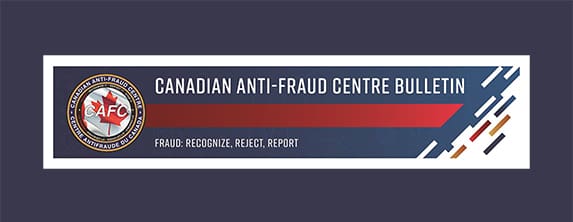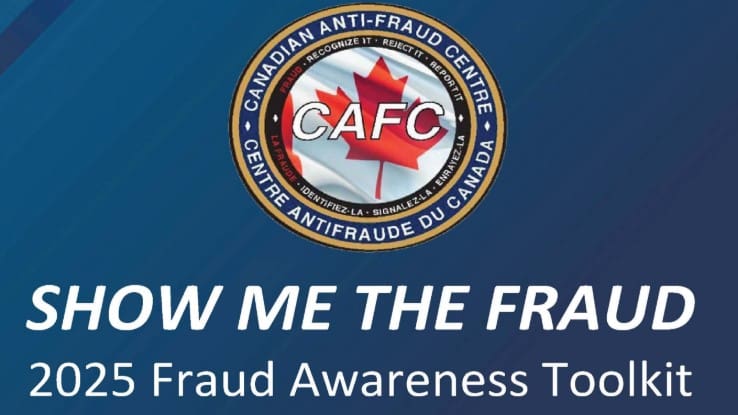Canadian Anti-Fraud Centre
At Westend Seniors Activity Centre, we care about the well-being and safety of our members and the community and we believe staying informed plays a vital role in healthy aging. That’s why we’re partnering with the Canadian Anti-Fraud Centre (CAFC) to share their latest news and updates, helping you stay informed and protected from fraud.
Check back regularly for new information and resources!
What is the Canadian Anti-Fraud Centre?
The Canadian Anti-Fraud Centre (CAFC) is a national police service that works to prevent and investigate fraud across Canada. It is jointly managed by the Royal Canadian Mounted Police (RCMP), Competition Bureau Canada, and the Ontario Provincial Police. The CAFC provides a safe and secure way for citizens and businesses to report fraud, learn about different types of fraud, and get tips on how to protect themselves.
CAFC BULLETIN

2026-01-01
CRIME STOPPERS MONTH
January marks Crime Stoppers Month 2026, a time to highlight the vital role Crime Stoppers programs play in helping law enforcement prevent and solve crime across Canada. Crime Stoppers’ ongoing national slogan, “Say It Here,” underscores the importance of providing anonymous tip information that can assist police in identifying perpetrators of crime.
The Canadian Anti-Fraud Centre (CAFC) is joining partners across the country to emphasize how crucial tip reporting is in the fight against fraud. Fraud networks are often sophisticated and far-reaching. While some operate internationally, many criminal groups have strong ties within Canada, recruiting local facilitators and using Canadian infrastructure such as phone numbers, bank accounts, and addresses to carry out their schemes.
The Importance of Whistleblowing
Anonymous tips play an essential role in fraud prevention and enforcement. They help police and the CAFC to:
- Identify local enablers and facilitators connected to larger fraud networks
- Trace financial movement, including money mule activity and cryptocurrency pathways
- Identify criminal infrastructure such as fraudulent phone numbers, emails, domains, and social media ads
- Connect cases that might otherwise appear unrelated
- Build stronger investigative files and prepare enforcement action
- Take disruption measures to interrupt fraud operations operating in Canada
CAFC BULLETIN

2025-10-01
CYBER SECURITY AWARENESS MONTH
October is Cyber Security Awareness Month, and this year’s theme is Get Cyber Safe – for future you. Cyber threats are constantly evolving, and so are tactics fraudsters use to exploit Canadians. The Canadian Anti- Fraud Centre (CAFC) would like to remind Canadians that cyber security isn’t only about protecting your devices; it’s also about protecting yourself from fraud. By learning how criminals operate and taking simple steps today, you can build strong cyber habits that will safeguard your money, your identity, and your future. This week, we are looking at protecting yourself from investment fraud. While investing can be a smart way to plan for the future, criminals exploit Canadians through promises of guaranteed returns, risk-free crypto investment platforms, and by using fake endorsements.
About Investment and Crypto Investment Fraud:
- Fraudsters use social media ads, text messages, emails, and fake trading platforms to lure Canadians into sending money.
- They may impersonate politicians, celebrities, financial advisors, or government agencies to gain trust.
- Once money is sent, it’s often transferred overseas and is very difficult to recover.
How to Protect Yourself from Investment Fraud:
- Be suspicious of any investment with “guaranteed” or “risk-free” returns.
- Never send money based on pressure or urgency.
- Verify if the investment companies are registered with your Provincial Securities Agency or the National Registration Search Tool.
- Prior to investing, ask for information on the investment. Research the team behind the offering and analyze the feasibility of the project.
- Be wary of individuals met on dating or social media who attempt to educate and convince you to invest into cryptocurrency.
- Beware of fraudsters asking you to open and fund new crypto accounts. They will direct you to send it to wallets they control.
Anyone who suspects they have been the victim of cybercrime or fraud should report it to their local police and to the Canadian Anti-Fraud Centre’s online reporting system or by phone at 1-888-495-8501. If not a victim, you should still report the incident to the CAFC.
Don’t fall victim to online scams! Read the full bulletin for valuable guidance on staying safe online.
Joint Advisory: Cyber officials warn Canadians of malicious campaign to impersonate high-profile public figures
June 23, 2025 | Canadian Centre for Cyber Security (CCCS) | Canadian Anti-Fraud Centre (CAFC)
2025 Show Me the Fraud Toolkit
We are excited to share the 2025 Show Me the Fraud Toolkit created by the CAFC. This resource is designed to support fraud awareness efforts by providing educational materials and messaging to help protect Canadians from fraud.
The toolkit includes:
- New technology and fraud
- Most common frauds and statistics
- Warning signs and how to protect yourself
- Be cyber secure and fraud aware checklists
We encourage you to use and share these resources with your networks to assist with the collective fight against fraud.

I am text block. Click edit button to change this text. Lorem ipsum dolor sit amet, consectetur adipiscing elit. Ut elit tellus, luctus nec ullamcorper mattis, pulvinar dapibus leo.
